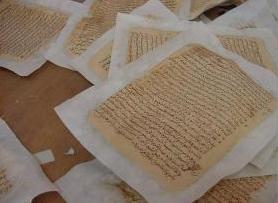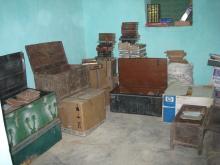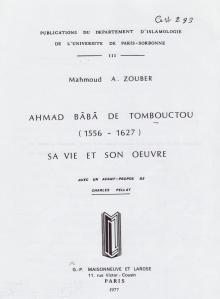
Our work with the manuscripts of Timbuktu continues. Researchers are involved in the ongoing translation of materials from the Ahmed Baba and Mamma Haidara collections. Thus far, due to researchers’ individual areas of focus, there has been an emphasis on the translation of manuscripts related to fatawa (Islamic legal rulings), Sufi practises, women, scribal practices and history. A collection of these translations are in preparation for publication.
On-going training

The Tombouctou Manuscripts Project regularly organises training for young scholars and researchers affiliated with the Project. These workshops are intended to assist scholars with their research and to encourage interaction between scholars affiliated with the Project. The scope of this training is broad, including language courses (in Arabic, French and English), public speaking workshops, academic writing seminars, as well as information technology and research skills workshops.
In addition to skills training, we have organised reading groups based on topics relevant to our field, including the history of the book, archive theory and the history of reading.
Other Manuscripts of Mali (Jenne)


The town of Jenne lies in the Inland Niger Delta region of Mali. Its history is closely linked with that of Timbuktu: Jenne was also part of the trans-Saharan Trade route and, as with Timbuktu, the town became an important centre of Islamic scholarship. Jenne's rich scholarly legacy is manifested in its contemporary manuscript collections, held mostly in family homes throughout Jenne and its surrounding areas.
Research and preservation projects addressing the Jenne manuscripts are still emerging. After visiting the town in 2009, the Tombouctou Manuscripts Project has committed to assisting local efforts to preserve and begin research into these manuscripts, through skills training of the local custodians.
African Ajami

While the Tombouctou Manuscripts Project centred on the manuscript tradition of West Africa from its origins, we also broadened our focus beyond Timbuktu, to Arabic writing cultures elsewhere in Africa. A major aspect of this process is connecting with scholars working on ajami writing cultures in other parts of the continent. Thus far our African ajami network includes experts from Niger, Mali, Nigeria, Ethiopia, South Africa as well as Norway and Poland. Our first meeting was held in December 2009. For more information, see Events.
We are always looking to expand this network, to include researchers working in other regions in Africa. If you are interested in joining our network, please contact us.
Cape Town

In 2008, the project began researching local Ajami writing traditions, including Arabic-Afrikaans and jawi (Arabic-Malay). Saarah Jappie undertook a pilot study, surveying the general situation of Ajami cultures in Cape Town. This study included the cataloguing of a private library of a local Capetonian, Imam Manie Bassier.
African Calligraphies

This project began with the calligraphy exhibition, From Istanbul to Timbuktu: Ink Routes and the workshops and academic seminar linked to it, held in August 2009. One of the main aims of the exhibition and the events surrounding it was to highlight African Islamic calligraphies as part of broader Islamic art. This aim was particularly significant, given that African calligraphies are rarely included in dominant representations of Islamic calligraphic traditions. The next phase of the project will focus on supporting budding Islamic calligraphers in Africa.
Publication

The Tombouctou Manuscripts Project team is currently working on several publication projects. The first is the publication of the manuscript translations produced by Shgamil Jeppie, Shahid Mathee, Ebrahiem Moos and other researchers affiliated with the project. The second project is the translation and publication of the seminal work Ahmad Baba de Tombouctou: sa vie et son oeuvre ('Ahmad Baba of Timbuktu: His life and works'), written by Mahmoud Zouber. Susana Molins-Lliteras is currently translating the book from French into English and will be preparing it for publication shortly.
In addition, the edited volume The Meanings of Timbuktu, currently available in English and French, is being translated and prepared for publication in Arabic and Japanese.
For a list of previous publications see Publications.
Book History in Africa

The subject of book history in Africa strongly informs the work of the Project and has become one of our main research themes. Thus, in addition to studying existing manuscripts, we are interested in exploring the contextual issues regarding manuscript production and culture on the Continent. This includes reading practices, the book trade, text circulation and literacy practices.
As a part of our work on this theme, we established a working group with several PhD and MA candidates from Africa as well as established researchers from the continent. Our students undergo an intensive training program in Cape Town, which consists of workshops around the themes of book history, reading cultures and archives. Students and researchers are also given academic writing support.